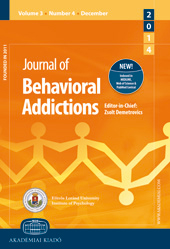Potential roles of masculine role discrepancy, discrepancy stress, and self-esteem in affecting addictive use of social networking sites among Chinese men: A random population-based study
Potential roles of masculine role discrepancy, discrepancy stress, and self-esteem in affecting addictive use of social networking sites among Chinese men: A random population-based study
Author(s): Xue Yang, Joseph T.F. Lau, Zixin Wang, Mason C. M. LauSubject(s): Behaviorism
Published by: Akadémiai Kiadó
Keywords: masculine role discrepancy; discrepancy stress; self-esteem; addictive use of social networking sites; male population
Summary/Abstract: Masculine role discrepancy (i.e., men perceiving themselves not living up to the ideal manhood and being less masculine than the typical “man”) and related discrepancy stress were associated with some risk behaviors. No study has looked at their relationships with addictive use of social networking sites (SNSs), an emerging potential public health concern. The study constructed a moderated mediation model to test whether masculine role discrepancy would be positively associated with discrepancy stress, which would, in turn, be positively associated with addictive use of SNS, and whether self-esteem would buffer (moderate) the association between masculine role discrepancy and discrepancy stress. Methods. A random population-based cross-sectional telephone survey interviewed 2,000 Hong Kong male adults in the general population. Results. Currently unmarried and non-cohabiting, younger, and better educated participants reported higher addictive use of SNS scores than others. Adjusted for these variables, masculine role discrepancy and discrepancy stress were positively associated, and self-esteem was negatively associated with addictive use of SNS scores. Path analysis indicated that masculine role discrepancy was associated with addictive use of SNS through discrepancy stress (mediation); self-esteem buffered (moderated) the association between masculine role discrepancy and discrepancy stress; self-esteem was not significantly associated with addictive use of SNS in this model with good fit. Discussion. The findings support the general strain theory’s postulation that strain is associated with stress, which is in turn associated with addictive use of SNS sites. Implications, potential interventions, and future studies are discussed in this study.
Journal: Journal of Behavioral Addictions
- Issue Year: 7/2018
- Issue No: 3
- Page Range: 676-685
- Page Count: 10
- Language: English

